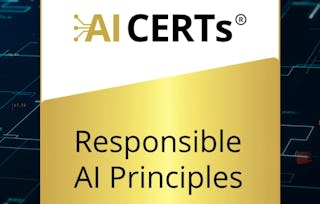Learning Outcomes:
This introductory-level course combined theoretical knowledge with actionable insights for real-world business scenarios, making it ideal for learners looking to integrate AI into the social ethics strategy. By the end of this course, you will be able to: • Understand AI Basics • Explore Ethical Dimensions • Grasp Regulatory Environments • Address Privacy and Fairness: • Practical Insights This course covers an Intermediate knowledge of AI technology and its current application in the business field. It also covers foundational topics of ethics and regulatory frameworks relevant to AI issues. The course also provides real-world case studies and future projections. This course integrates AI technology with business applications and social ethics, providing a unique and comprehensive learning experience. Participants will gain practical skills for implementing AI solutions responsibly and in compliance with regulations. The course connects theoretical concepts to actual business and ethical scenarios through case studies and real-world examples. Discussions on future AI trends and ethical dilemmas further prepare learners to lead in their fields. This Intermediate-level course is designed for students and professionals in various fields, including business managers, IT specialists, policymakers, and those aspiring to integrate AI into their career paths. To be successful in this course, you need to have a background in fundamental business operations and basic knowledge of AI (common AI applications in business and basic algorithms).















